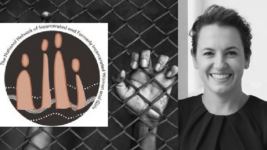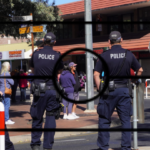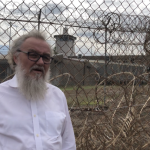National Network’s Tabitha Lean on Country Liberal Crackdown on NT Inmates

After cleaning up at the August 2024 election, the Finocchiaro ministry has been implementing its tough-on-crime agenda for the Northern Territory, which by late October meant the removal of women inmates from Mparntwe-Alice Springs and sticking them in the overcrowded Darwin Correctional Centre.
But that’s the way the Country Liberal Party sets about governing in the territory – just like an 19th century penal colony.
One can imagine that current NT chief minister Lia Finocchiaro laid out her pre-election plans to lower the age of criminality down from 12 to 10, as well as the reinstatement of spit hoods in police watchhouses, as she was standing before the local courthouse chewing on tobacco.
Although the Country Liberals have finally determined what to do with the notorious Don Dale child prison that the Royal Commission into the Protection and Detention of Children in the Northern Territory ordered to be shut down seven years ago, after the ABC’s July 2016 documentary Australia’s Shame exposed it as being the site of torture and teargassing.
The Finocchiaro ministry announced that the long-delayed Holtz child facility was to be opened late last month and the kids in Don Dale would be moved there, whilst around 50 low-security male inmates were to be moved into the child gaol, which was to undergo an “immediate conversion” into an adult facility.
These developments have all the hallmarks of a return to a colonial mindset, especially when considering the disproportionate number of First Nations people incarcerated in the Northern Territory.
ABS custody figures for the September quarter 2024 outline that of the 2,270 adult prisoners in the NT prison system, 2,010 of them, or 88 percent were First Nations adults. This is despite First Nations people only accounting for 30 percent of the NT population overall.
Of the 129 women prisoners in the NT in September, 120, or 93 percent of them, were First Nations women, while in terms of male prisoners, 1,890, or 88 percent of the overall 2,141 adult men in prison were Aboriginal and Torres Strait Islander men.
On 3 July this year, there were 49 youths imprisoned in the NT with 48 of these kids being First Nations youths, while only 1 non-Indigenous child was locked up.
National Network of Incarcerated and Formerly Incarcerated Women and Girls spokesperson Tabitha Lean has been tracking the carceral developments in Finocchiaro’s NT.
Sydney Criminal Lawyers spoke to the First Nations woman about the drastic state of the incarcerated population in the northern jurisdiction.

The Country Liberal Party took out a landslide victory in the Northern Territory election back in August, which was always going to translate into a crackdown on youth crime.
However, not long after the Finocchiaro government took office, the National Network of Incarcerated and Formerly Incarcerated Women and Girls started sounding the alarms bells about the treatment of the adult women prisoner population in the territory.
Tabitha, can you explain what’s been happening to women prisoners in the NT?
The National Network started sounding the alarms as soon as the CLP announced their election policies that said they would include building new prisons and expanding prison beds, reducing the age of criminal responsibility for children and bringing back the use of spit hoods. However, the CLP was still elected to government.
Significant issues as we see them right now, include that on 31 October, 36 women were forcibly transferred from Mparntwe to Darwin Correctional Centre (DCC) with no notice.
The women are being kept in Sector 4 and are being imprisoned in appalling conditions. Reports out of there are extremely concerning, and they include overcrowding.
The Sector 4 facility is overcrowded, unsafe and designed to accommodate 80 people, but it’s now housing over 100. Women are sleeping on mattresses on the floor.
When asked about why women are sleeping on mattresses on the floor, Northern Territory corrections commissioner Matthew Varley unapologetically remarked, “I’m not going to make any apologies for the fact that these prisoners are on mattresses on the floor.”
This callous response underscores the indifference of a system that prioritises punishment over human dignity.
Extremely high temperatures exceeding 30 degrees Celsius are involved in the detainment of these women, with reports of non-functioning air conditioners and minimal shade available when they’re outside of cells.
The National Network has partnered with Sweltering Cities to run an online petition, campaigning the government to take immediate action to ensure the Darwin Correctional Centre meets basic health standards, including functional cooling and safe living conditions.
The move has caused severe disconnection from women inmates’ families and Country, as they are detained 1,500 kilometres from their communities, in direct violation of the foundational recommendation of the Royal Commission into Aboriginal Deaths in Custody.
At present, women are not able to have visits with their children or families due to the extraordinary distance from their families and communities.
The government has committed to consulting with the women about how they would like to connect with family, yet there is little that can be facilitated, when travel and distance is expensive and logistically difficult, and peoples’ access to technology is scarce, so online visiting is also problematic.
The physical and emotional isolation of women from their families is devastating to their wellbeing.
These conditions breach multiple international standards, including The Nelson Mandela Rules or the United Nations Standard Minimum Rules for the Treatment of Prisoners, which emphasise the need for humane treatment, adequate living conditions and safeguards against overcrowding.
The Bangkok Rules or United Nations Rules for the Treatment of Women Prisoners and Noncustodial Measures for Women Offenders, stress the importance of gender-sensitive approaches and the maintaining of family connections for women in custody.
The National Network have met with representatives of Northern Territory corrections, and they have confirmed that there is no plan for the women’s return to Mparntwe.
In fact, it is likely the women will stay in DCC. Government officials have advised that their infrastructure master plan includes the building of additional facilities – 48 new women’s beds in Mparntwe in the first quarter of 2025 – and work camps.
The National Network opposes the building of new prisons and extending prison bed numbers. We call for a moratorium on new prison builds.
We believe that if you expand prison bed numbers, the state will find ways to fill those bed numbers, and that the money that would be spent on building new prisons, should instead be spent on supporting people to remain safely in our communities.
Holtze children’s prison in Darwin is another carceral issue that’s developing in the NT. This youth gaol is replacing the notorious Don Dale child facility, which was supposed to have been closed about seven years ago but is now being repurposed as an adult gaol.
What’s are the problems the National Network foresees with the coming arrangements in regard to the imprisonment of children at the new Holtze facility? And what would be an alternative in the opinion of the network?
The National Network unequivocally opposes the opening of the Holtze children’s prison in Darwin, as it perpetuates the harmful and outdated practice of caging children – a practice we oppose in all forms as an abolitionist organisation.
While it may appear as though replacing Don Dale is a step forward, the Holtze prison represents a continuation of the same carceral logic that has failed to protect or support children and instead, entrenched them in cycles of harm, violence and disempowerment.
The problems with Holtze children’s prison, include that the systemic harm will remain intact.
A new building does not address the systemic racism and violence inherent in the children’s justice system.
As seen in Don Dale and other facilities, incarceration traumatises and violates children, many of whom are already victims of structural racism, intergenerational trauma and poverty.
Then there’s the mass representation of Aboriginal children in the prison. Aboriginal children are mass incarcerated, making this prison another mechanism of colonial oppression.
It upholds a system that criminalises First Nations children rather than addressing the root causes of their criminalisation.
The new facility also provides false promise of change. Promises of “better conditions” or “more humane treatment” in new prisons are a complete contradiction.
The promises mask the same punitive practices, including solitary confinement, limited access to education and inadequate healthcare.
The physical structure may change, but the oppressive nature of incarceration persists.
Then there’s the issue of the misallocation of resources. The immense financial cost of constructing and operating a new prison could be better spent on community-led initiatives that support children and families, address poverty, and reduce the need for state intervention.
So, rather than pouring resources into perpetuating the incarceration of children, the National Network advocates for transformative, community-driven approaches that prioritise care, connection and healing.
These abolitionist alternatives include investment in community supports, so that funds are redirected into culturally appropriate, trauma-informed services led by Aboriginal organisations. These should include housing, healthcare, mental health services, education and family support.
There are also transformative justice practices, which can replace punitive responses to harm with transformative processes that engage children, their families and affected parties to address the root causes of harm and build accountability in nonpunitive ways.
And further, we advocate for the decriminalisation of poverty and survival. So, many children are criminalised due to factors like racism, homelessness, family violence or poverty. And addressing these root causes through systemic changes will prevent criminalisation in the first place.
The position of the National Network is that we must move beyond replacing one prison with another and imagine a world where children are supported, not incarcerated.
You can put lipstick on a gorilla, but it’s still a gorilla. Therefore, the Holtze prison, no matter how “modern’, remains a prison that perpetuates violence and harm.
We call for its resources to be redirected to community-led, abolitionist solutions that centre the well-being and dignity of all children. Solutions that keep kids in their homes, communities and classrooms.
The National Network is also raising concerns over a rising bail crisis, specifically in relation to prisoners in Mparntwe-Alice Springs.
But issues with bail seem to have always been on the cards if the Country Liberals did get in as they’ve been pushing for tighter youth bail for a number of years now.
Why is bail becoming more of an issue in the NT over the last months? And how is the state of the remand population in general in the territory?
The National Network is deeply concerned about the worsening bail crisis in the Northern Territory, particularly in Mparntwe.
This issue highlights the systemic injustices of a punitive legal system that disproportionately targets Aboriginal people, both adults and children.
The situation has escalated due to policy decisions and practices that prioritise incarceration over community-based solutions.
It is also symptomatic of a system that is underfunded, with very little plan, other than lock them up and throw away the key.
Bail is becoming more problematic for a number of reasons that include punitive bail reforms, as the NT government has implemented increasingly restrictive bail laws, including presumptions against bail for children and adults accused of certain offences.
These laws disproportionately affect Aboriginal people, who are already overpoliced and overincarcerated.
Another issue is that pretrial detention has become the default, as courts and law enforcement have been relying on remand as a default response rather than considering alternatives, leading to unnecessary incarceration for people who pose no threat to public safety.
Then there’s the political posturing. In the lead-up to elections, parties like the CLP have amplified tough-on-crime rhetoric, using bail as a political tool to appeal to voters.
This approach prioritises punitive measures over addressing the systemic issues driving criminalisation.
There’s the issue of resource strain, as the courts, legal aid services and diversion programs are under resourced, leading to delays in processing bail applications and a lack of viable alternatives to custody, which has resulted in a growing remand population.
This has driven the latest issue in Mparntwe, which involves a critical staffing shortage in the Mparntwe court system that’s resulted in the NT Chief Judge drastically cutting back bail application hearings, leaving vulnerable people languishing in custody over the Christmas period.
Men and women, presumed innocent until proven guilty, are being held in conditions that can only be described as torture, as they involve no natural light or access to fresh air, no opportunities for exercise or education, no access to phone calls or personal visits and overcrowded cells with lights left on 24/7.
The decision to stop bail applications after 3 pm further exacerbates this injustice. However, anyone who pleads guilty will have their bail application heard.
Legal experts are rightly concerned that prioritising guilty pleas over bail applications is a deliberate attempt to coerce defendants into pleading guilty for the sake of expediency.
This is a gross miscarriage of justice and undermines the principle of the presumption of innocence.
In terms of the state of the remand population in the NT, well, the majority are on remand. There is an unprecedented number of people being remanded in custody in the NT, and the average number of days people are spending on remand is longer than ever before.
Racial disparities are also involved. Aboriginal people are mass incarcerated on remand, reflecting systemic racism in policing, judicial decision-making and the broader justice system
There’s the impact on families and communities as well. Remand disrupts lives, families, and communities, as people lose jobs, housing and the ability to care for their children.
Remand exacerbates the social issues that often lead to criminalisation in the first place.
There’s the inhumane condition that people on remand are often subjected to in these overcrowded and under-resourced facilities, with limited access to education, healthcare, and legal support.
From an abolitionist perspective, the rising bail crisis and the growth of the remand population reflect a legal system that criminalises poverty and disadvantage rather than addressing root causes of harm.
From the abolitionist standpoint, we advocate for the repeal of laws that create presumptions against bail and implement a presumption of release, particularly for children.
We recommend redirecting resources to community-led programs that address the social determinants of harm, such as housing, mental health services and family support.
We prioritise decarceration and investment in decarceration strategies that ease the pressure on the prison system and improve conditions inside and moves us closer to an abolitionist future, such as releasing everyone on remand immediately and supporting them to live safely in the community, ensuring access to legal representation, and prioritising transformative justice approaches.
Another point is that the systemic racism of the criminal justice system must be acknowledged and dismantled, as this structural racism drives the overpolicing and mass incarceration of Aboriginal people in the NT.
The current bail crisis in the NT is a symptom of a colonial system that prioritises punishment over care.
True safety and justice will only be achieved when the systemic factors driving incarceration are dismantled and resources are redirected to support communities rather than prisons.
The Indigenous incarceration rate in the Northern Territory is completely off the scale as in March this year, 88 percent of the adult prisoner population was made up of First Nations people, while the child prisoner population is usually made up of at least 90 percent Aboriginal kids, which at times can jump to 100 percent.
In your understanding, what is happening in terms of the criminalisation of First Nations people in the Northern Territory?
The Northern Territory embodies the brutal legacy of the colony, where the entire system is designed to criminalise, control and subjugate First Nations people.
The astronomical incarceration rates – 88 percent of the adult prisoner population and 90 to 100 percent of the child prisoner population being Aboriginal – are not anomalies or accidents.
They are the inevitable outcome of a colonial system built to oppress and exploit Blak bodies and Blak lives.
The NT is a racist colonial space, with its foundations steeped in the dispossession, surveillance and control of First Nations people.
From the violent theft of land to the imposition of laws designed to disempower and displace, the NT operates as a frontier where colonial domination persists in its most glaring form.
The legal system is not neutral: it is a weapon of colonialism that targets Aboriginal people as part of maintaining state power.
Criminalisation of First Nations people takes a number of paths, which includes the overpolicing of Aboriginal communities.
Aboriginal people in the NT are relentlessly policed. Minor infractions, survival crimes and behaviours stemming from systemic poverty and trauma are disproportionately criminalised, fuelling the pipeline into prisons.
Then there are the punitive laws and policies. These are laws such as mandatory sentencing, restrictive bail provisions, and policies that disproportionately target Aboriginal people, criminalise poverty, homelessness and systemic disadvantage.
Intergenerational trauma and structural inequality pervade the NT criminal justice system.
The NT government has failed to address the intergenerational impacts of colonisation, including dispossession, family separation and economic exclusion.
Instead, these structural inequalities are treated as individual failings, with incarceration as the default response.
There’s the control of children. The imprisonment of Aboriginal children – sometimes representing 100 percent of the child prison population – is a stark continuation of the colonial project.
These children are criminalised for behaviours that should be met with care, support, and community responses.
And there’s economic and racial exploitation at play here. The prison system profits from the incarceration of Aboriginal people, sustaining industries and jobs tied to their imprisonment.
Prisons in the NT are not just sites of control but also mechanisms of racial and economic exploitation.
Abolitionists consider that the NT’s legal system is not broken, as it’s designed to uphold colonial power by subjugating First Nations people.
From an abolitionist perspective, the solution is not reforming this racist system but dismantling it entirely and addressing the foundations of colonial oppression.
In order to dismantle the system, decarceration needs to take place, via the immediate release of Aboriginal people from prisons and the closure of facilities that perpetuate harm.
Self-determination has to be realised, as resources, power and decision-making are transferred to Aboriginal communities to lead culturally grounded, community-based responses to harm and social issues.
The criminalisation of poverty, homelessness, and survival has to stop. We need to end punitive laws that disproportionately target First Nations people.
Land back and the provision of reparations is also in order. The NT’s systems of control is built on stolen land.
Justice cannot be achieved without addressing the ongoing theft, with the return of land to Aboriginal people.
The control of colonial systems must be brought to an end. True justice requires dismantling colonial institutions, including the NT’s justice system, and replacing them with systems rooted in care, equity and First Nations sovereignty.
The NT’s astronomical incarceration rates for Aboriginal people are a violent reflection of a racist colonial state that exists to control and oppress Blak lives.
To break free from this cycle of harm, the NT must confront its colonial foundations, dismantle the systems perpetuating harm and invest in First Nations-led solutions that honour sovereignty, care and justice.
And lastly, Tabitha, the National Network has submitted a complaint to the United Nations about the types of conditions NT inmates are being subjected to.
Can you elaborate upon the details of the complaint made and what sort of outcomes you’re hoping for?
In response to the NT breaches of UN conventions, the National Network has referred these matters to the United Nations and called for urgent action.
Complaints have been sent to Australia’s representative on the Committee on the Elimination of Discrimination Against Women, the UN Working Group on Arbitrary Detention and the UN Special Rapporteur on Torture.
Each complaint highlights the systemic violence faced by women in detention and demands accountability for these violations.
Specifically, our complaints highlight Australia’s failure to meet its obligations to The Convention on the Elimination of All Forms of Discrimination against Women (CEDAW).
The breaches reported to CEDAW highlight Australia’s failure to uphold its obligations under the convention and related international standards, particularly concerning the treatment of incarcerated women at Darwin Correctional Centre (DCC).
Key issues include overcrowding, unsafe and inhumane conditions, extreme heat without functioning air conditioning and inadequate bedding, compounded by the transfer of Aboriginal women 1,500 kilometres from their families and Country.
These conditions violate the Bangkok Rules, Nelson Mandela Rules, and CEDAW articles 2, 12, 14, 15 and 16, as they fail to ensure gender-sensitive management, culturally appropriate care and the preservation of familial and cultural connections.
The systemic discrimination and neglect disproportionately harms Aboriginal women, reflecting broader injustices in Australia’s correctional practices.
The second complaint was made to the UN Special Rapporteur on Torture and Other Cruel, Inhuman or Degrading Treatment or Punishment.
It details systemic human rights violations in Australia’s Northern Territory, focusing on arbitrary detention, inhumane prison conditions, extended remand periods without conviction and the disproportionate targeting of Aboriginal people.
It highlights severe overcrowding, denial of natural light and family contact and procedural delays leading to indefinite detention, contravening the Nelson Mandela and Bangkok Rules, as well as international treaties, like the International Covenant on Civil and Political Rights and the International Convention on the Elimination of All Forms of Racial Discrimination.
The submission emphasises the racialised impact of these practices on Aboriginal people and urges the committee to hold the Australian government accountable, conduct investigations and issue urgent recommendations to address these breaches.
The last submission was to the Working Group on Arbitrary Detention. It raised urgent concerns about arbitrary detention practices in Alice Springs, which we believe breach international human rights standards, particularly the Nelson Mandela Rules and the Bangkok Rules.
These practices include the arbitrary adjournment of bail hearings, often leaving people imprisoned indefinitely without the chance to contest their imprisonment, which violates the right to timely judicial oversight and legal representation.
Additionally, overcrowded and inhumane detention conditions – such as permanent lighting, lack of natural light, inadequate ventilation, no access to exercise or visits, and insufficient provisions for the specific needs of women, particularly Aboriginal women – further exacerbate the violations.
These conditions undermine both the dignity and health of prisoners, especially those on remand, who are presumed innocent yet are treated as convicted prisoners, compounding the injustice.
The letter calls for the UN Working Group on Arbitrary Detention to prioritise a visit to Alice Springs during its 2025 mission to address these violations.







